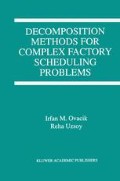Abstract
The previous chapters have outlined the industrial scheduling problems for which we wish to develop scheduling algorithms, the advantages of decomposition algorithms for these problems and a review of decomposition methods that have been developed for various scheduling problems in the past. In particular, Chapter 5 discussed workcenter-based decomposition algorithms for the job shop environment without sequence-dependent setup times. These approaches are generic in that they do not exploit special structure in the routings or other aspects of the problem.
Access this chapter
Tax calculation will be finalised at checkout
Purchases are for personal use only
Preview
Unable to display preview. Download preview PDF.
References
Adams, J., Balas, E., Zawack, D., “The Shifting Bottleneck Procedure for Job-Shop Scheduling”, Management Science 34, 391–401 (1988).
Balas, E., Lenstra, J.K., Vazacopoulos, A., “One Machine Scheduling with Delayed Precedence Constraints”, Management Science 41, 94–109 (1995).
Bhaskaran, K., Pinedo, M., “Dispatching”, Chapter 83 of Handbook of Industrial Engineering, G. Salvendy(ed.), Wiley, New York (1991).
Dauzere-Peres, S., Lasserre, J.B., “A Modified Shifting Bottleneck Procedure for Job Shop Scheduling”, International Journal of Production Research 31, 923–932 (1993).
Garey, M.R., Johnson, D.S., Computers and Intractability: A Guide to the Theory of NP Completeness, W.H. Freeman, San Francisco (1979).
Lee, C.Y., Martin-Vega, L.A., Uzsoy, R., Hinchman, J., “Implementation of a Decision Support System for Scheduling Semiconductor Testing Operations”, Journal of Electronics Manufacturing 3, 121–131 (1993).
Lenstra, J.K., Sequencing by Enumerative Methods, Mathematical Centre Tract 69, Mathematisch Centrum, Amsterdam (1977).
Uzsoy, R., Lee, C.Y., Martin-Vega, L.A., “Scheduling Semiconductor Test Operations: Minimizing Maximum Lateness and Number of Tardy Jobs on a Single Machine”, Naval Research Logistics 39, 369–388 (1992).
Vepsalainen, A.P.J., Morton, T.E, “Improving Local Priority Rules with Global Lead-time Estimates: A Simulation Study”, Journal of Manufacturing and Operations Management 1, 102–118 (1988).
Author information
Authors and Affiliations
Rights and permissions
Copyright information
© 1997 Springer Science+Business Media New York
About this chapter
Cite this chapter
Ovacik, I.M., Uzsoy, R. (1997). A Generic Decomposition Procedure for Semiconductor Testing Facilities. In: Decomposition Methods for Complex Factory Scheduling Problems. Springer, Boston, MA. https://doi.org/10.1007/978-1-4615-6329-7_6
Download citation
DOI: https://doi.org/10.1007/978-1-4615-6329-7_6
Publisher Name: Springer, Boston, MA
Print ISBN: 978-1-4613-7906-5
Online ISBN: 978-1-4615-6329-7
eBook Packages: Springer Book Archive

